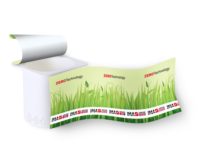Sustainable Packaging is Natural Fit for Eco-conscious Beauty Brands
High-end beauty brand Innerbark chose the compostable Sulapac Nordic Collection by Quadpack and compostable labels to ensure biodegradation of their jars alongside their natural skincare product.

Image courtesy of Sulpac
It’s no secret that the beauty industry creates vast amounts of plastic waste. In the US alone, almost 8 billion plastic units were manufactured just for the beauty and personal care industry in 2018. As environmental consciousness has increased, the pressure is on brands to find ways of decreasing packaging and developing more environmentally-friendly options.
However, the journey towards sustainable packaging is not without its challenges ranging from difficulties with some materials to the limitations of recycling opportunities.
“Sustainable is not enough. Recyclable is not enough. Several sustainable packaging options compromise too much: for instance, cardboard may be incompatible with the product and will not necessarily protect it from moisture or oxidizing,” says Dr. Suvi Haimi, CEO and Co-Founder of Sulpac, the bio-based material company used by Innerbark for its beauty packaging.
“Furthermore, sustainable alternatives can sometimes fall behind on aesthetics and not meet the high standards of premium and luxury brands. Trailblazers in beauty demand more – they want sustainable, beautiful and functional packaging,” she continues.
Eco-conscious brands focusing on natural and clean beauty were among the first to turn to more sustainable packaging solutions. It has also become a key way for independent, emerging luxury brands to make a statement about their mission and values. Now, the trend is beginning to expand to mainstream brands and luxury brands.
Founded in 2019 by Nichola and Paul Vickers, a husband and wife team, Innerbark set out to offer consumers an informed choice of sustainable beauty products. The brand’s affordable luxury body and skincare line launched earlier this year, and their products have already been featured in British Vogue.
“Our mission is to replace conventional plastics completely, and the partnership with Sulapac made it possible for us. The beauty of being a small company means that we have been able to utilize the latest packaging innovation fast without the constraints a large company may have”, says Nichola Vickers, Innerbark’s CEO and Co-Founder.
The brand chose the industrially compostable Sulapac Nordic Collection by Quadpack with packaging made from FSC-certified wood chips from industrial waste streams and plant-based materials, offering an alternative to fossil-fuel-based plastics.
“The change is inevitable. People trust brands and companies to take action towards a more sustainable future – and do so without compromising on quality. For the beauty industry, this means that all brands from mainstream to luxury need to find sustainable solutions for both packages and what is inside them,” says Dr. Haimi.
Sulapac has also collaborated on packaging with brands such as I+M, Edinburgh Skincare, RDP Skincare, Akane, and more. Several brands Sulapac has worked with have received acclaim for their products. I+M, which chose Sulapac jars for their We Reduce! range, was one of the finalists of the German Sustainability Award Design in 2021. Akane was winner of the 2021 Pure Beauty Global Award, and RDP Skincare winner of the Swedish Beauty Oscar 2021.
This spring, Sulapac also announced sustainable beauty packaging for water-based cosmetics that biodegrades without leaving permanent microplastics behind. With around 90% of the cosmetics market consisting of water-based emulsions, there has been a massive need for alternative packaging.
Looking for a reprint of this article?
From high-res PDFs to custom plaques, order your copy today!





